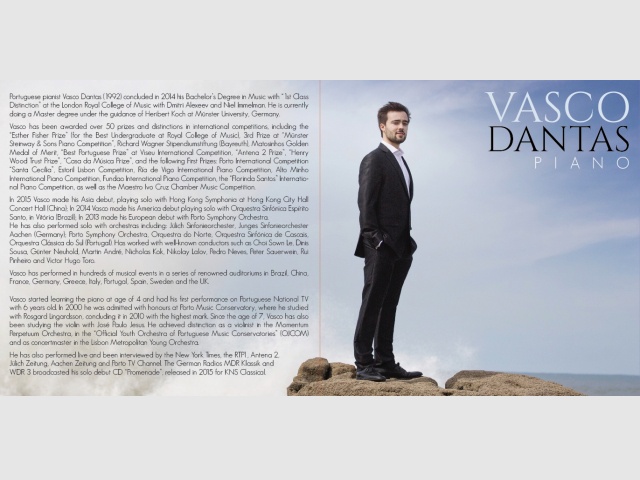Golden Liszt from Vasco Dantas
Post Date: 31 May 2018
Post Type: Piano Things
Golden Liszt
Vasco Dantas, Piano
KNS Classical A/043
http://www.murraymclachlan.co.uk/post/detailview/id/35
The young multi-prize winning Portuguese pianist Vasco Dantas studied in Porto with Rosgard Lingardsson before entering the classes of Dmitri Alexeev and Niel Immelman at the Royal College of Music in London. In recent years he has worked with Heribert Koch at Münster University.
In this bold and confident debut CD Dantas convincingly and fearlessly presents all six Liszt-Paganini studies with aristocratic elegance, spaciousness, authority, technical ease and thoughtfulness. His handling of the 4th and 5th are impressive for their pinpointing of colouristic variety. ‘Copy and paste’ is totally alien to Dantas’ aesthetic and pianistic approach. His changes of sound and every perceptive shifts in perspective are deeply impressive, indicative of a really thoughtful artist.
Superficial brilliance is also reassuringly absent from his extremely spacious and majestic account of the great B minor sonata. It is at the diametrically opposite position in terms of approach from Martha Argerich (who plays the sonata in 26 minutes 24 seconds, as opposed to Dantas’ 32 minutes 46 seconds). The art of pontificating, declamatory authority and parlando are strongly realised in this young Portuguese artist’s hands. For some his persistent separation of phrase markings will raise questions- but I personally found the clarity of articulation that results from this strong sense of musical punctuation deeply refreshing and most interesting (I cannot recall anyone else doing this sort of thing with this sonata). Wrong notes do not bother me and are of little significance as Vasco has a strong grasp of the bigger picture. However, the one passage that is deeply controversial is from bars 634-650. This is taken extremely slowly and lacks to my mind the requisite sense o energetic momentum necessary to inevitably move the sonata forward to the exhilarated heights that find their climax in the double octaves and beyond from bar 682-710.
Much to enjoy elsewhere, especially in the expansively expressive slow movement. One senses a deep reflection, with much care and sensitivity taken over every semiquaver.
By means of light relief it is lovely to have Chopin’s ‘Souvenirs de Paganini’ included as an encore.
Warmly recommended, especially for the astonishingly confident Paganini etudes
Murray McLachlan

